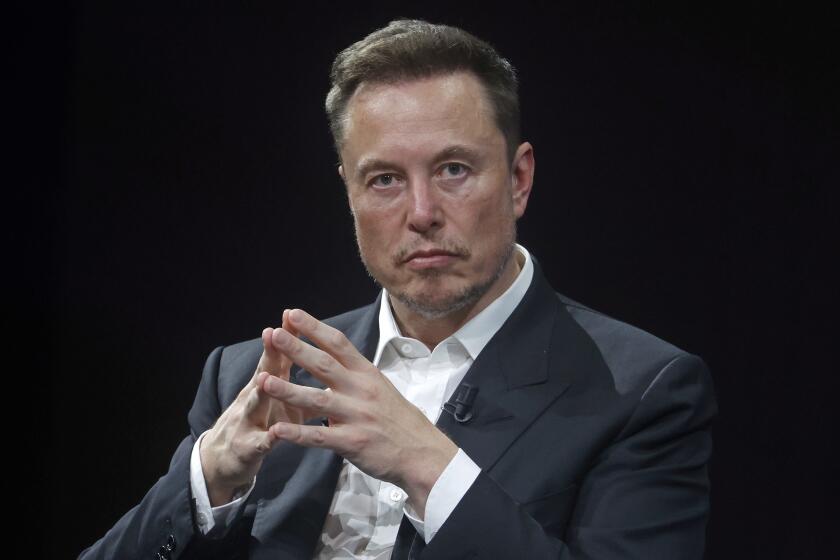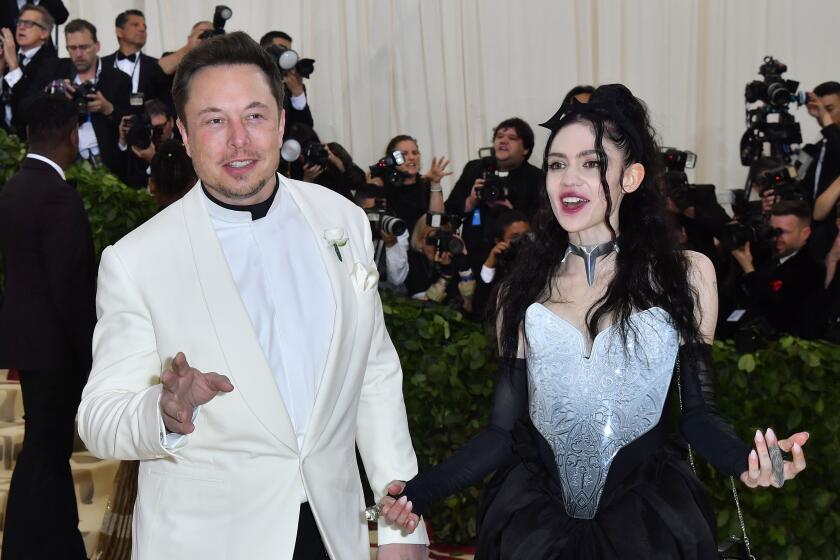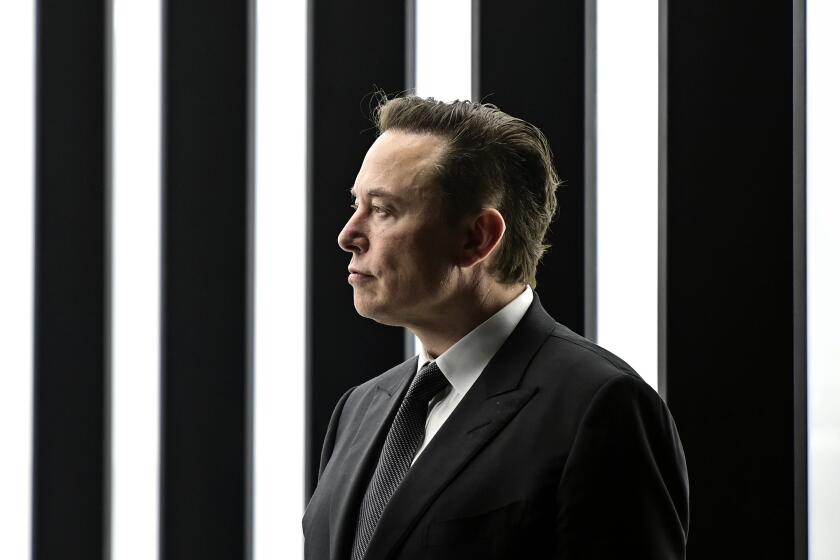The biggest ideas and pettiest rages in Walter Isaacson’s Elon Musk biography
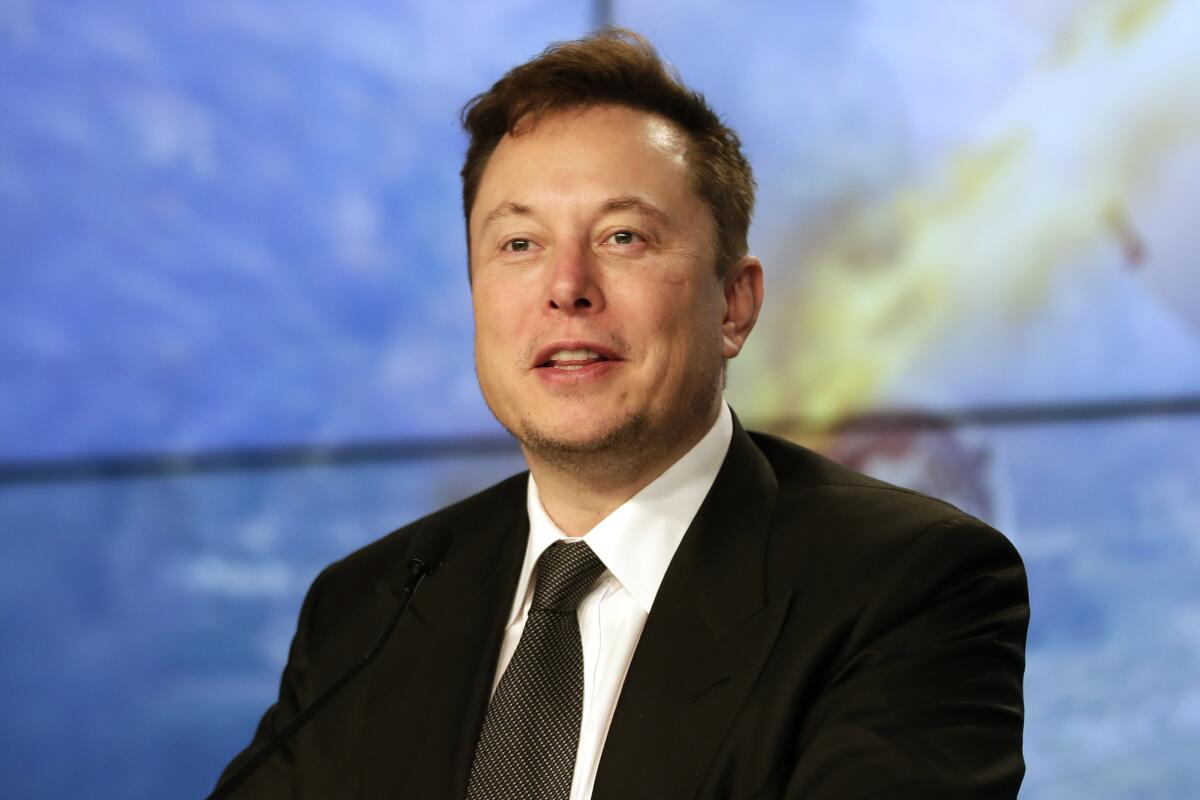
- Share via
On the Shelf
Elon Musk
By Walter Isaacson
Simon & Schuster: 688 pages, $35
If you buy books linked on our site, The Times may earn a commission from Bookshop.org, whose fees support independent bookstores.
Walter Isaacson’s newest book, “Elon Musk,” about the temperamental corporate executive who runs Tesla, SpaceX and the company formerly known as Twitter, goes on sale this week.
Musk is already one of the most well-known and extensively covered leaders in American corporate life (and one of its most unavoidable figures on the service he has renamed X). Isaacson’s biography is a Musk agonistes: a portrait of a (largely) self-made, emotionally volatile entrepreneur from South Africa who has a tortured relationship with his father and an addiction to crises of the self-inflicted variety.
Musk is tormented, erratic and rude, over and over again
Musk’s moods are variously described as cycling through “light and dark, intense and goofy, detached and emotional, with occasional plunges into what people around him call ‘demon mode’”; he’s “childlike, almost stunted,” “a drama magnet,” “not bred for domestic tranquility”; he has “a craving for storm and drama” and “erratic emotional oscillations.” Multiple people describe him as having undiagnosed Asperger’s. At one point, Musk calls himself bipolar. His volatile emotional states are the biggest constant in a book that zigzags from cars to rockets, tunneling to AI, solar energy to neural implants.
Call it the ‘Isaacson Accord’: the agreement behind Walter Isaacson biographies, including ‘Elon Musk,’ to leave the assumption of difficult genius untouched.
Isaacson repeatedly likens Musk to his estranged father, Errol Musk, also reportedly prone to volatile moods, abrasive behavior, credit-grubbing, flimflammery and conspiracy theories. Elon’s mother, Maye, said Errol “hit her” before the pair divorced, something that Errol denied. Musk cut off his father after Errol had a child with a woman Elon considered his half-sister — Jana — whom Errol had raised as his stepdaughter since she was 4. In an email Errol wrote to Elon for Father’s Day in 2022, he called Joe Biden a “freak, criminal, pedophile president” and that in South Africa, “with no Whites here, the Blacks will go back to the trees.”
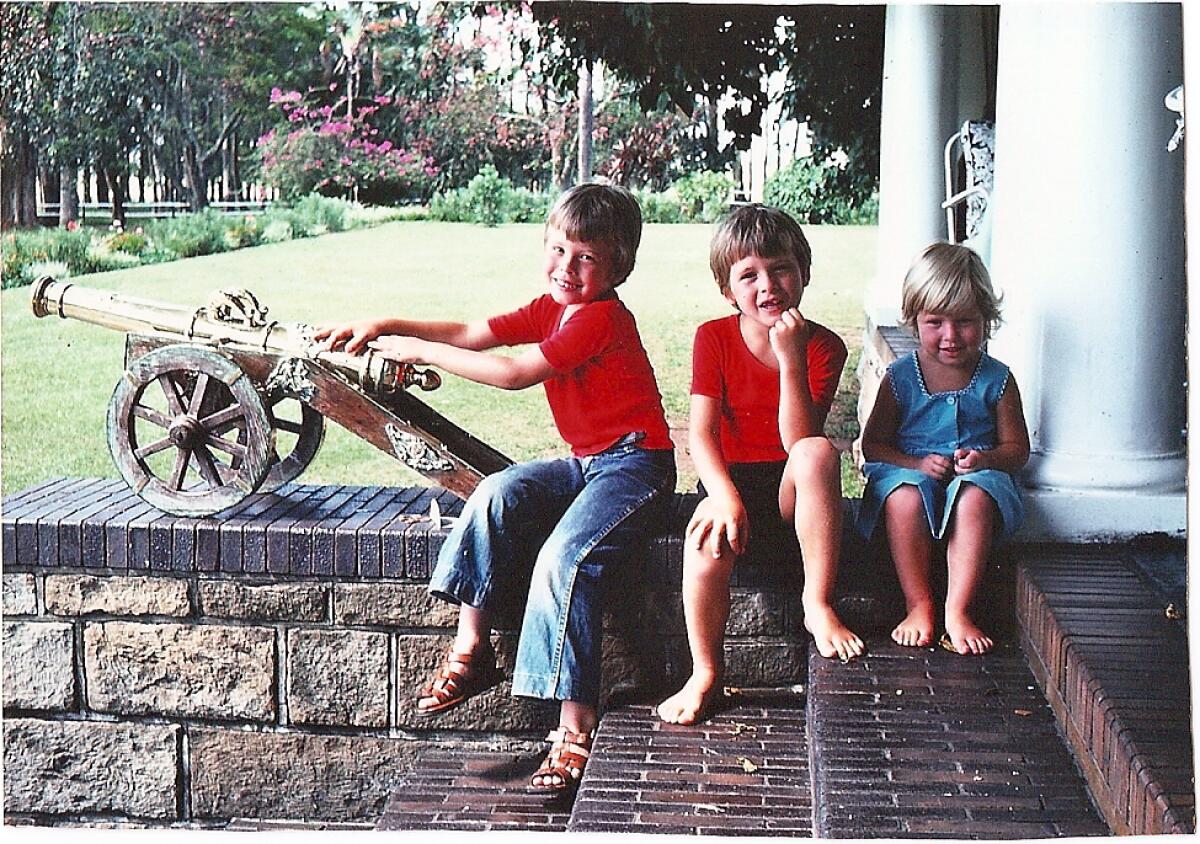
Nothing Elon Musk says in the book is as jarring as his own father’s sometimes bizarre and racist comments. But elsewhere, Elon’s own frequent lack of empathy is bolstered by ample evidence. During the first dance at his wedding with his first wife, Justine, he whispered to her, “I am the alpha in this relationship.” In 2016, he accused journalists of “killing people” (by discrediting self-driving technology) after they asked questions about the first drivers to die in Tesla Autopilot accidents. He was briefly estranged from his brother, Kimbal, after the latter — who once helped rescue Tesla financially — asked for help with his own restaurants. Elon replied that they were doomed, and “I think they should die.”
It’s natural for a reader to wonder whether trying to decarbonize the auto industry or avoid humanity’s extinction justifies the chaos, the bullying, the poor labor standards — the trouble. Isaacson weighs in on the subject only at the end of his book: “Do the audaciousness and hubris that drive him to attempt epic feats excuse his bad behavior, his callousness, his recklessness? The times he’s an a—? The answer is no, of course not.”
Then, a few paragraphs later, the needle on Isaacson’s moral compass wobbles: “But would a restrained Musk accomplish as much as a Musk unbound? ... Sometimes great innovators are risk-seeking man-children who resist potty training. They can be reckless, cringeworthy, sometimes even toxic. They can also be crazy. Crazy enough to think they can change the world.”
Elon Musk and Grimes have a third child named Techno Mechanicus, the tech mogul confirmed ahead of the release of Walter Isaacson’s forthcoming biography.
The two Elon Musks, before and after 2018’s Tesla ‘production hell’ (or Amber Heard, or his daughter’s transition)
The year 2018 was an inflection point in the perception of Musk as a public figure, one that foreshadowed his pandemic evolution in 2020 from moderate Democrat to trolling conservative. When a group of children were trapped in a cave in Thailand, Musk tweeted that one rescue diver who dismissed his offer to build a submersible was a “pedo guy.” (Musk later apologized, but not easily.) On Joe Rogan’s podcast, he smoked marijuana, risking his status as a U.S. government contractor. He shot a Tesla Roadster into space.
Behind the scenes, the summer of 2017 through the fall of 2018 encompassed the most “hellacious” period of Musk’s life, Isaacson writes: “Musk went through periods when he oscillated between depression, stupor, giddiness, and manic energy.” Isaacson traces Musk’s tailspin to the news of his father’s relationship with his stepdaughter — as well as his own stormy relationship with the actor Amber Heard, who had recently gone through a tumultuous divorce with the actor Johnny Depp.
Heard “drew [Musk] into a dark vortex” around 2017, Isaacson writes, “that lasted more than a year and produced a deep-seated pain that lingers to this day. ... His brother and friends hated her with a passion.”
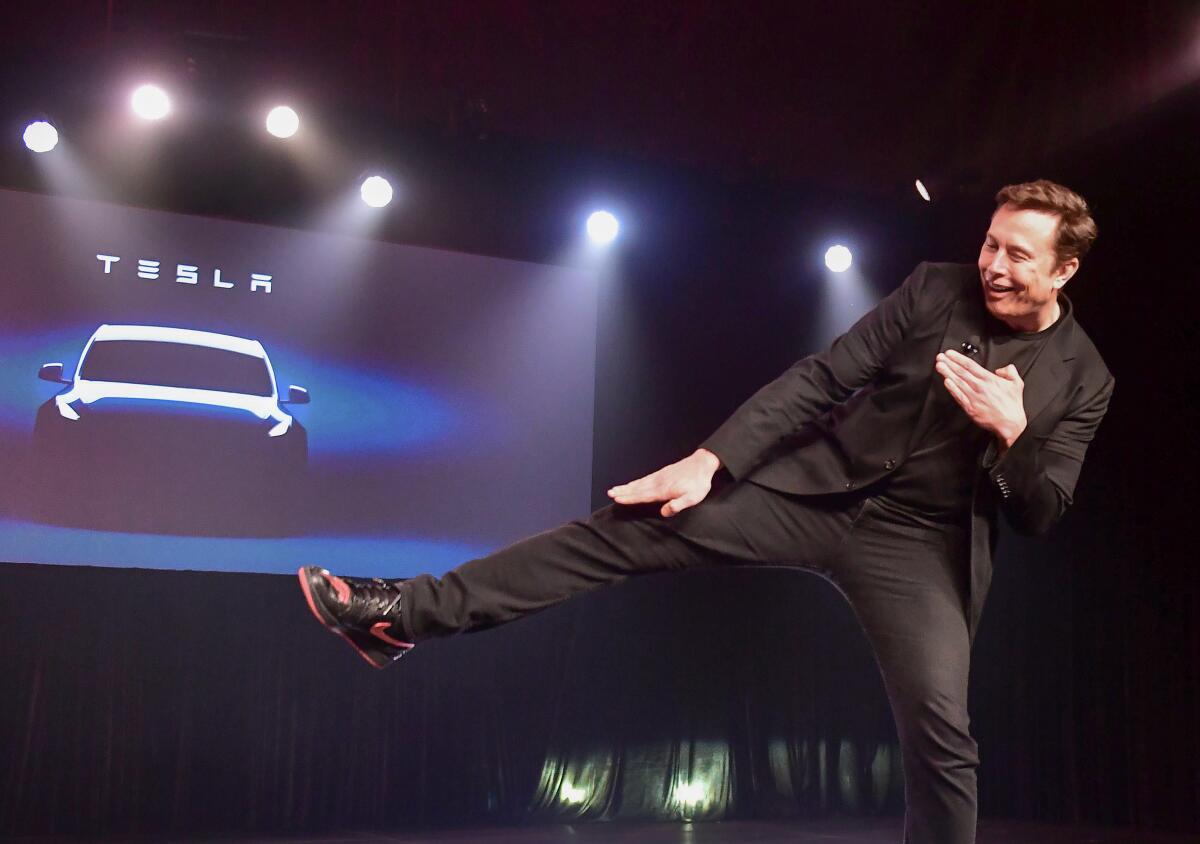
There were plenty of other stressors that didn’t involve a public figure who’s already taken enough public bludgeoning after the Depp-Heard defamation trial. One of the biggest was the “production hell” at Tesla in 2018, when the survival of the company (and Musk’s reputation) hinged on meeting a seemingly impossible production target for the Tesla Model 3. Musk prowled the factory in a “frenzy of insanity,” he recalled later, “getting four or five hours’ sleep, often on the floor. I remember thinking, I’m like on the ragged edge of sanity.”
In his ‘Elon Musk’ biography, Walter Isaacson examines the billionaire’s political evolution, from fundraising for Democrats to trolling progressive politicians.
What gave his turmoil a political bent was his daughter Jenna’s gender transition around 2020, followed by her decision to cut ties with him. Musk blamed this on her becoming “a full communist” as a result of her progressive education at a Los Angeles private school, Crossroads. This is around the time “woke mind virus” worked its way into his vocabulary.
Musk’s team got part of the 405 freeway repainted to improve his Tesla commute
In 2015, Isaacson reports that Musk would drive from his home in Bel Air to SpaceX headquarters near LAX and wanted his Tesla to be able to complete the trip using the company’s not-quite-functional Autopilot system. One lane on the 405 Freeway caused Musk’s Tesla trouble because the lane markers were too faded. Musk’s staff hatched a plan to sneak out onto the freeway at 3 a.m. to repaint the lanes themselves until they found a Musk fan in a governmental “transportation department” (it’s not specified which one) who helped arrange for the lanes to be repainted in exchange for a tour of SpaceX.
Musk’s first principles and Bill Gates’ belly
In the book, Musk is repeatedly depicted as being obsessed with “first principles,” namely, the importance of getting to Mars, making humanity a multiplanetary species, avoiding dictatorship by artificial intelligence. Isaacson rarely contexualizes or scrutinizes Musk’s positions on these issues himself, leaving the reader to get competing views from Musk’s own peers in the tycoon space.
Following fellow right-winger RFK Jr., Elon Musk blames the Jews, in the form of the Anti-Defamation League, for his self-inflicted disaster at X (formerly Twitter).
At a party in 2013, Isaacson reports, Musk argued with Google’s Larry Page about the danger of artificial intelligence on the grounds that human consciousness was something special in the universe. Page called Musk’s position sentimental nonsense and “specist.” Well, yes, I am pro-human,” Musk told Page. Determined that “the future of AI should not be controlled by Larry,” he cofounded OpenAI with Sam Altman (but left the project before ChatGPT was released).
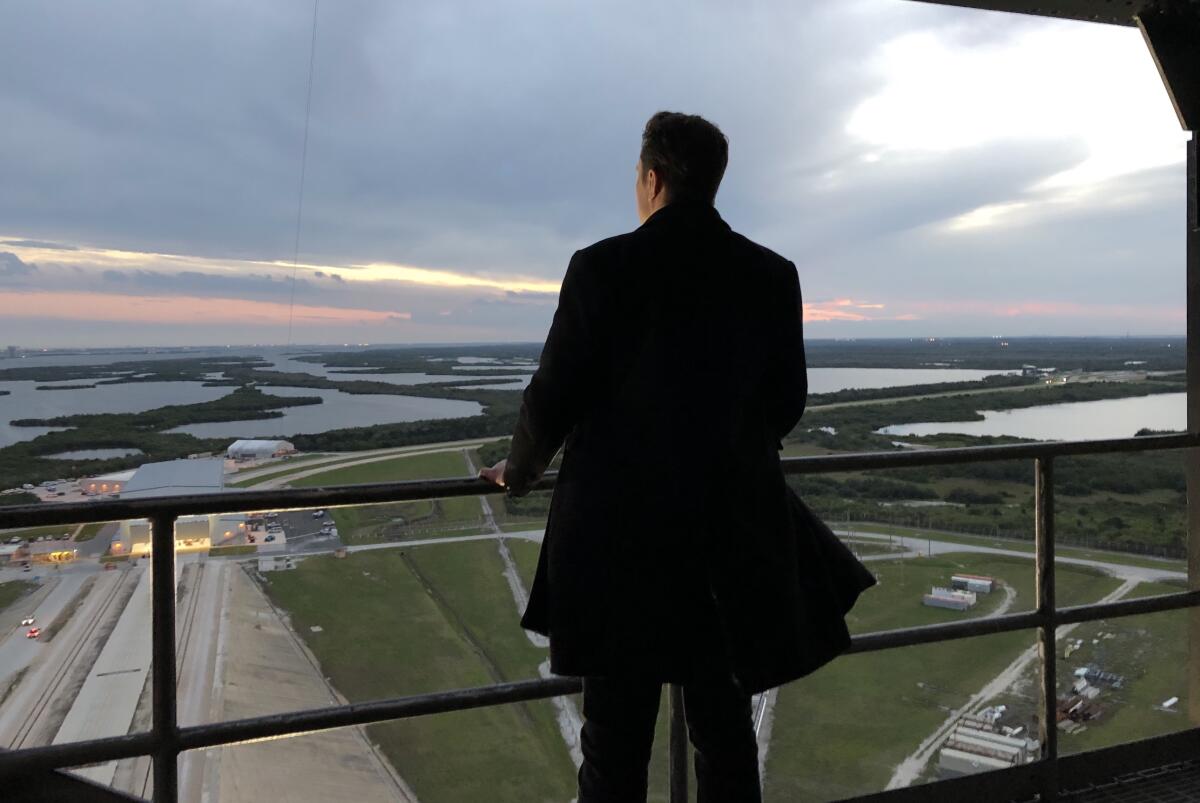
First-principles thinking tends to close off alternatives. (Is getting to Mars really the best way to save humanity?) The book strikes a rare note of skepticism when describing a visit from Bill Gates to advocate different priorities (such as eradicating mosquitoes). Musk thinks his wealth is better spent on his human-saving companies. “He’s overboard on Mars,” Gates tells Isaacson. “... It’s this crazy thing where maybe there’s a nuclear war on Earth and so the people on Mars” will return and restore humanity.
Later, Musk realized Gates still had a short position on Tesla stock. “It’s pure hypocrisy,” Musk complained to Isaacson. “Why make money on the failure of a sustainable energy car company?” He retaliated by tweeting a picture of Gates with a bulging belly.
Musk thought attacking Rep. Nancy Pelosi’s husband was one of his worst mistakes
After the husband of Rep. Nancy Pelosi (D-San Francisco) was seriously injured by a man who invaded their home in 2022, Musk tweeted a link suggesting Paul Pelosi had gotten into a fight with a male prostitute, saying: “There is a tiny possibility there might be more to this story than meets the eye.” He deleted the tweet and, Isaacson reported, “said privately that it was one of his dumbest mistakes.” His brother agreed.
“You’re an idiot,” Kimbal, who “stopped following Elon on Twitter because it was too nerve-wracking,” told his brother of the Pelosi tweet. “Stop falling for weird s—.” Kimbal Musk was down on his brother’s Twitter acquisition altogether. “It’s a pimple on the a— of what should be your impact on the world.”
Elon Musk’s now-deleted tweet of an unfounded story about Paul Pelosi sparked controversy over how false information propagates on Twitter.
The emerald mine affair
Over the years, Musk critics have accused him of getting a leg up in life because of money his father made from emerald mines. Isaacson, who interviewed Errol Musk, reports that Errol struck a black-market deal to receive emeralds from three mines in Zambia to cut in Johannesburg, but that Errol did not have an ownership stake in the mines. He reportedly earned $210,000 from those mines before the business collapsed in the 1980s.
But Isaacson calls it a “myth” that Elon emigrated in 1989 with wealth from his father’s emerald business. Isaacson writes that Errol’s emerald business had become “worthless” years earlier, and that he only gave his son $2,000 in traveler’s checks when Elon Musk moved to Canada that year.
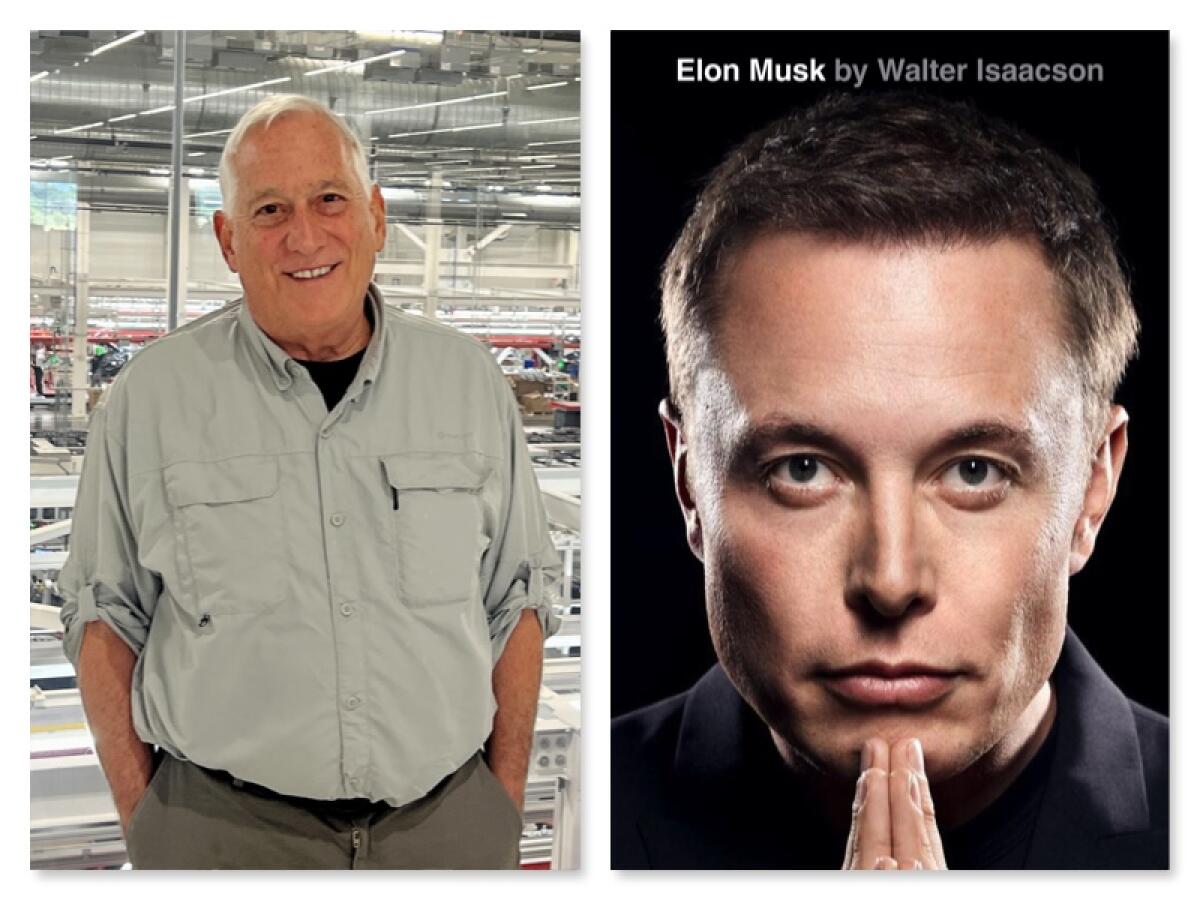
Isaacson and the muddied waters of the Musk-Ukraine controversy
In the days before its release, Isaacson’s book has picked up headlines for a chapter, excerpted in the Washington Post, detailing Musk’s intervention in the Russian-Ukrainian war. In March 2022, after Russia launched a wide-scale invasion of Ukraine, Musk quickly offered to donate Starlink satellite internet services to the Ukrainian government to aid in the country’s military defense.
But that September, Isaacson wrote, Musk effectively thwarted a Ukrainian submarine drone attack against the Russian fleet based in Russian-occupied Crimea. “The Russian ambassador had warned him, in a conversation a few weeks earlier, that attacking Crimea would be a red line and could lead to a nuclear response,” Isaacson wrote.
It was the ensuing detail from Isaacson that caught headlines: Musk “secretly told his engineers to turn off coverage within a hundred kilometers of the Crimean coast,” which neutralized the drones. It sounded as if Musk had acted at the behest of the Russian government.
SpaceX’s Starlink satellite communications terminals are seen as vital for keeping civilians connected and providing crucial military communications.
On Friday, Isaacson posted a correction on Musk’s social media service, X (formerly Twitter): “The Ukrainians THOUGHT coverage was enabled all the way to Crimea, but it was not. They asked Musk to enable it for their drone sub attack on the Russian fleet. Musk did not enable it...”
The rest of Isaacson’s chapter on the incident gives a little more context. Musk was surprised at the blowback, given that he had directly donated support to the Ukrainian military defense in a way that no other company could. But he also seemed to have bitten, hard, on the Russian government’s bluffs of potential nuclear retaliation; Ukraine has since launched many attacks both on Crimea and Russian soil without major escalation.
“How am I in this war?” Musk asked Isaacson in a call. “Starlink was not meant to be involved in wars.” Following the furor, Starlink contracts with government agencies, which then decide where its tech is used for military purposes. A government rather than a private individual getting to decide matters of war: You might call it a first principle.
Book Club: Walter Isaacson
What: Author Walter Isaacson joins the L.A. Times Book Club to discuss “Elon Musk” with Times columnist Anita Chabria.
When: 2 p.m. Pacific Oct. 1
Where: The El Segundo Performing Arts Center. Get tickets.
Join: Sign up for the Book Club newsletter for the latest books, news and live events.
More to Read
Sign up for our Book Club newsletter
Get the latest news, events and more from the Los Angeles Times Book Club, and help us get L.A. reading and talking.
You may occasionally receive promotional content from the Los Angeles Times.
